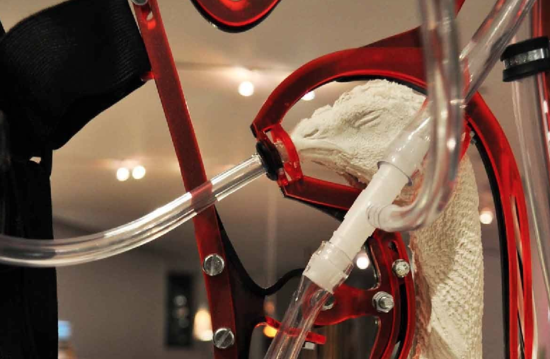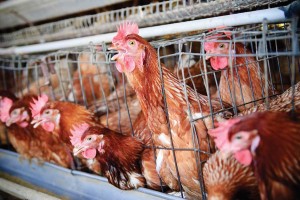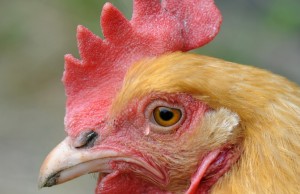Remember you can vote once per day for the About.com Atheism Awards. I’m one of five nominees for Best Atheist Blog. More details here.

Via the Daily Dish, André Ford, a student in the architecture department at the Royal College of Art came up with a kind of grotesque final project for a class focusing on “how a dense and vertical architecture can bring back food production and consumption in the city.” Ford designed an apparatus that would give a whole new definition to the phrase “factory-farmed meat.” He proposed that chickens bound for the pot on industrial farms be lobotomized early in life.
By removing the cerebral cortex of the chicken, its sensory perceptions are removed. It can be produced in a denser condition while remaining alive, and oblivious. The feet will also be removed so the body of the chicken can be packed together in a dense volume.
Food, water and air are delivered via an arterial network and excreta is removed in the same manner. Around 1000 chickens will be packed into each ‘leaf’, which forms part of a moving, productive system.
Most of my friends reacted with disgust when I shared the story, and I’m still trying to decide if that’s the right reaction. Here’s where I stand: if it’s a given that we’re going to raise animals in unpleasant conditions, better to kill them early and just keep their bodies going artificially until we make use of them. Though it seems preferable to not raise animals in conditions where they’d be better off brain-dead in the first place.

I don’t think the grotesqueness of Ford’s idea is sufficient to disqualify it. My suspicion is that we’re reluctant to switch to a new, unpleasant system — even if it’s better than the status quo — because to choose to switch would imply a kind of assent. We imagine that not overthrowing the old way is equivalent to remaining neutral, but a choice to maintain the current norms is still a choice. Animals shouldn’t be tormented so that we can imagine our hands are clean.
If you want to reject Ford’s idea, I think you need to believe that it is meaningfully worse than the current system on industrial farms. I can imagine a couple ways of making that argument. The first point for the status quo is that, because we know the animals are capable of pain, we might be spurred to minimize that suffering. Lobotomizing the animal frees us from that cognitive dissonance and probably locks us into the new system indefinitely.
But I’m really skeptical about the strategy of heightening the contradictions by making everything even worse. The brutality of factory farming isn’t exactly a secret, but most people make their peace with their meals. (I’ve been vegetarian since I was five, but this is because I’m a picky eater; I never had to take a moral stand on the issue).
I can also imagine arguing that, especially in my virtue ethics framework, it’s bad to be in the habit of turning off the sensory capacities of other living beings. I certainly think this is an important point, but I’m not sure how much better it is to be in the habit of tormenting those beings in the first place. Changing them from sensing animals to unperceiving ones seems less troubling when I remember our ultimate goal is to change them from live animals into dead ones.
I’d be quite interested in your instincts and explanations in the comment thread. It’d be helpful if you’d give a sentence or two about your general approach to ethics (or metaphysical allegiances) so we know what framework you’re working in. I’m still trying to thrash this one out.
Oh, and bonus question: if you disapprove of Ford’s idea, do you also disapprove of lab-grown meat — no animal involved? I’m trying to pin down whether people are objecting to the ethics of lobotomizing chickens or the aesthetics of mechanized meat production.












